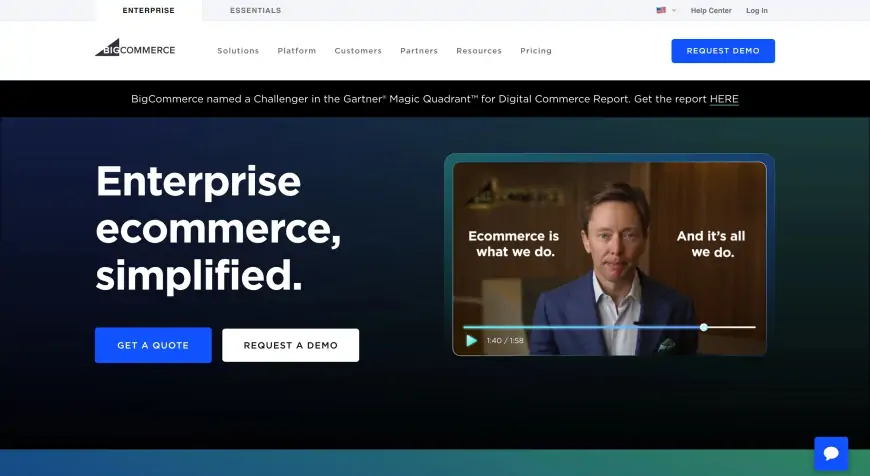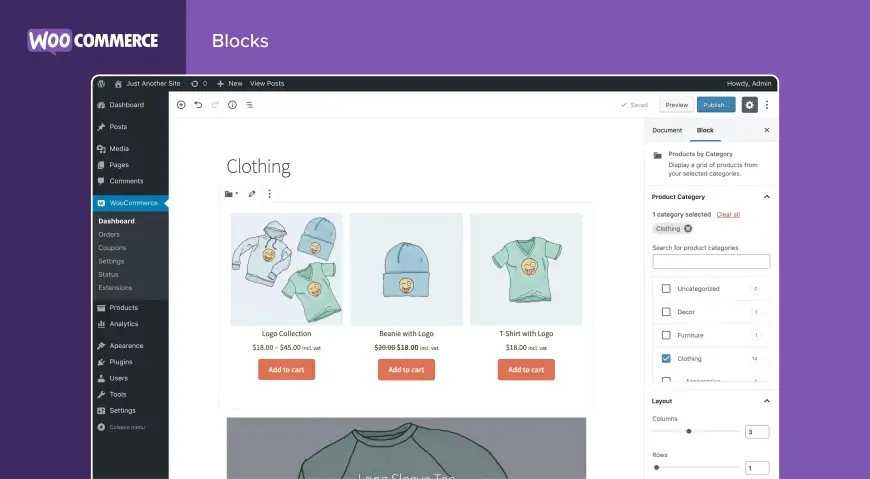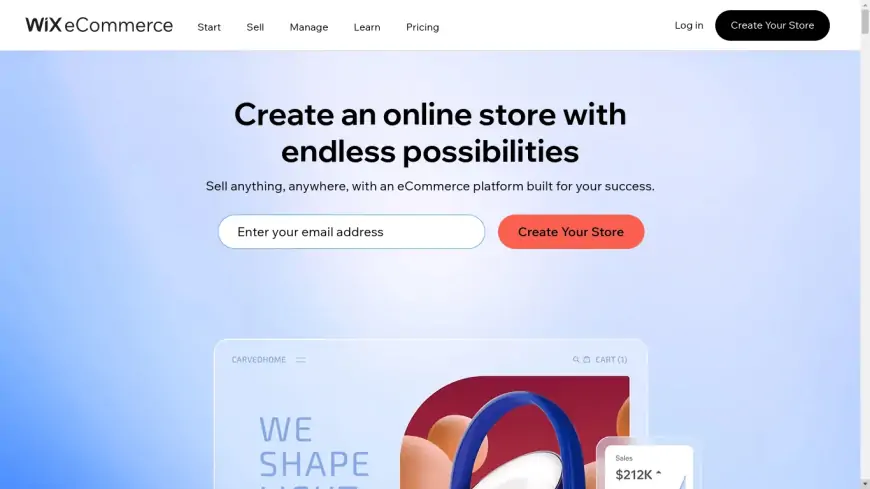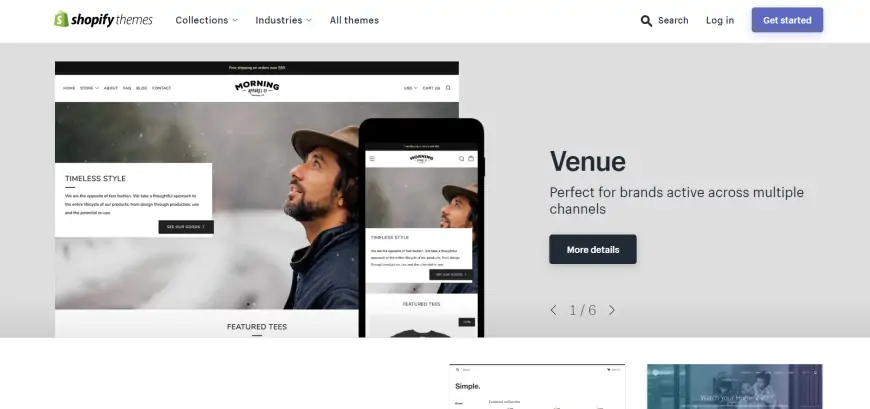What is a Commerce Platform? 5 popular eCommerce Platforms
Unlock the secrets of commerce platforms with Digimagg's comprehensive guide. Learn how they revolutionize retail and boost business growth.

What is a Commerce Platform?
As a retailer operating both in-store and online, managing all aspects of your business can be daunting. Many opt for separate eCommerce and point-of-sale (POS) systems. But why not streamline with a single platform?
A commerce platform integrates both online and offline operations, consolidating data into one dashboard. This unified view empowers owners to analyze customer data effectively, optimize inventory, and identify trends.
Beyond sales tracking, a commerce platform facilitates online payments, customer support, and vendor management. It enables seamless interactions across channels, allowing businesses to monitor customer engagement comprehensively.\
Essential elements of Commerce Platforms
While not all commerce platforms are identical, they share consistent core components, aiding store owners in efficiently overseeing their daily business tasks.
1. eCommerce Platform. Connect your online channels
Many individuals confuse the eCommerce platform with the commerce platform. While an eCommerce platform facilitates online buying and selling, a commerce platform encompasses both online and offline sales.
An eCommerce platform assists in managing web hosting, marketing, order fulfillment, inventory control, payment processing, and other essential elements for online selling.
For instance, apparel retailers can employ an eCommerce platform to host their web stores, manage orders, and process payments from potential customers.
While eCommerce platforms encompass all the necessary tools for running a successful online store, they do not track offline sales.
Consider the scenario of using separate solutions to monitor online and offline sales. This approach entails additional effort and expenses. To avoid overselling products due to discrepancies in inventory levels across channels, manual tracking becomes necessary.
For businesses operating both online and offline sales channels, adopting a more integrated system like the commerce platform is preferable. It's important to note that the eCommerce platform serves as a fundamental component within the broader framework of the commerce platform.
2. Point-of-Sale (POS) System. Connect your offline channels
A point-of-sale (POS) system encompasses the hardware, software application, and payment processing services utilized by businesses to handle and accept customer payments. This system serves to manage customer transactions, monitor sales, and store inventory data.
The configuration of a POS system varies depending on the business model. For instance, in a brick-and-mortar establishment, the POS system typically refers to the device employed for processing transactions, such as traditional cash registers.
In contrast, for an online storefront, the POS system typically refers to the software application utilized for processing customer payments. Examples of such POS software include NetSuite SuiteCommerce and Lightspeed Retail.
Modern POS systems facilitate credit and debit card payments processing, report and receipt generation, inventory management, and employee hour and activity tracking. They seamlessly integrate with various business tools, including accounting software, eCommerce platforms, and analytics tools.
In contemporary business operations, whether managing a physical storefront, an eCommerce platform, or both, leveraging cloud-based POS solutions is increasingly common. The rationale behind this shift lies in the accessibility afforded by cloud-based POS, enabling businesses to monitor their sales and operational data from any location with a POS app and an internet-enabled device.
Types of eCommerce Platforms
The optimal eCommerce platform for your online business is the one that offers the necessary features tailored to its requirements.
|
There are 3 primary types of eCommerce platforms available:
|
Advantages of eCommerce Platforms
Utilizing an eCommerce platform offers numerous advantages:
- Enhanced Reach: By leveraging this platform, you can expand your customer base globally, tapping into a broader audience of potential buyers. Given the increasing prevalence of online shopping, establishing an online store is a strategic move to grow your business.
- Shopping Convenience: Online shopping eliminates the constraints associated with traditional retail, such as transportation expenses and limited operating hours. Customers can effortlessly browse and purchase products from the comfort of their homes, using their mobile devices, and have their purchases delivered directly to their doorstep.
- Heightened Brand Exposure: Unlike physical stores, which are bound by geographical limitations, an online presence provides unparalleled visibility for your brand. With a digital storefront, you can attract a larger audience and make it easier for potential customers to discover your products and services.
Disadvantages of eCommerce Platforms
While utilizing an eCommerce platform presents numerous opportunities for those looking to establish an online business, it also comes with its drawbacks.
- Intense Market Competition: Although eCommerce offers lucrative prospects and is relatively easy to initiate and expand compared to brick-and-mortar stores, the marketplace is highly saturated. Expect to encounter a significant number of competitors vying for attention in your chosen niche.
- Unexpected Expenses: Operating on an eCommerce platform can incur substantial costs, particularly if you opt for offering free shipping and delivery to attract more sales. Adopting a connected eCommerce model may help mitigate costs and business risks; however, there are limitations to the scalability of your online business with this approach.
- Challenges with Inventory Management and Order Fulfillment: While eCommerce platforms provide tools for managing orders and inventory, handling a large volume of orders can pose challenges.
3. Payment Processing. Connects business payments
Payment processing stands as a pivotal element within a commerce platform, enabling businesses to monitor payment information across various channels.
All commerce platforms employ an integrated payment processing system to oversee payments across channels, offering a more efficient alternative to manual entry, which is not only time-consuming but also susceptible to human errors.
Integrating leading merchant services and credit card payment processors such as Merchant One and Square Payments into your commerce platform enhances its capabilities.
4. Supplier Marketplace. Connects businesses to suppliers
A commerce platform seamlessly integrates all aspects of your business operations, eliminating the need to switch platforms for different functions. Through the supplier marketplace, businesses can conveniently order products and oversee purchases from vendors and suppliers.
The advantages of the supplier marketplace extend beyond retailers. B2B wholesalers, vendors, and suppliers can also utilize it to streamline purchase order tracking within a single dashboard.
Types of Commerce Platforms
Different types of commerce platform solutions cater to various business types. For retailers, the retail commerce platform is the optimal choice to meet specific business requirements.
Conversely, for businesses in the hospitality sector, such as restaurants and hotels, opting for a hospitality commerce platform provider is advisable. This specialized platform offers eCommerce functionality and features tailored specifically to the needs of the hospitality industry.
Commerce platforms can generally be categorized into three main types:
- Platform-as-a-Service (PaaS) Platforms: Similar to SaaS platforms, PaaS platforms also deliver solutions primarily online. The key distinction lies in the ability for users to customize the application to suit their unique requirements.
- Software-as-a-Service (SaaS) Platforms: These commerce platforms provide solutions online through third-party hosting providers on the cloud.
- On-Premise Platforms: Companies utilizing on-premise platforms manage all aspects of their commerce business using their own solutions. Besides cloud hosting, which they rent from leading cloud hosting providers like Amazon Web Services (AWS), they develop their own solutions. This platform is well-suited for large online stores.
What advantages does a retail Commerce Platform offer?
The key advantage of opting for a retail commerce platform as opposed to a generic one lies in its tailored focus on retail operations.
For retail business owners, this platform offers targeted solutions catering to everyday needs such as inventory management, eCommerce capabilities, and omnichannel customer features.
Utilizing a retail commerce platform benefits three main stakeholders: shoppers, retailers, and suppliers/vendors.
Advantages of a retail commerce platform for shoppers
The benefits of using a retail commerce platform extend to shoppers just as they do to retailers. Whether shopping online or offline, a retail commerce platform ensures a consistent and streamlined user experience.
- Enhanced Shopping Convenience: Shoppers appreciate the flexibility to transition seamlessly between various channels and locations. By leveraging a retail commerce platform, retailers can provide comprehensive omnichannel support, making it easier for shoppers to engage and make purchases across different touchpoints.
- Diverse Payment Options: A fundamental feature of retail commerce platforms is their robust payment processing services. With integrated payment capabilities spanning across channels, shoppers have the flexibility to utilize a wide array of supported payment methods and currencies when making purchases.
Benefits of a retail Commerce Platform for retailers
Retailers are the primary beneficiaries of a retail commerce platform. Let's delve into the advantages:
- Facilitates Management Across Multiple Sales Channels: A retail commerce platform simplifies the management of business operations across various channels and locations. For instance, retailers can seamlessly connect with suppliers, replenish stock, and oversee different product orders for their stores directly from the commerce platform.
- Provides Flexible and Adaptive Solutions: One of the key advantages of utilizing a retail commerce platform is its agility in responding to shifts in customer shopping behaviors and eCommerce trends. For example, integrating a new sales channel like TikTok Shopping can be easily accomplished without the need for implementing an entirely new eCommerce solution.
- Offers Insights into Comprehensive Business Operations: A retail commerce platform furnishes retailers with a holistic and up-to-date overview of their business activities. Retailers utilize this platform to generate sales reports, monitor inventory levels, and assess employee performance. Leveraging this data enables retailers to refine their business processes effectively.
Advantages of a retail Commerce Platform for suppliers and vendors
Suppliers and vendors constitute the third group of stakeholders who reap the rewards of a well-functioning retail commerce platform.
Outlined below are the benefits:
- Facilitates Supplier-Vendor Connections: Every retail commerce platform features a supplier marketplace, streamlining the process for retailers to connect with B2B wholesale suppliers. This platform supports automatic catalog updates and assists suppliers in effectively managing orders from retailers.
- Harnesses Commerce Platform Data: Suppliers rely on data from the commerce platform to enhance their operational efficiency. While they can readily monitor orders, they often lack insight into how well their supplied products perform in the consumer marketplace. A retail commerce platform equips suppliers with additional supply chain data, enabling them to accurately gauge their products' performance.
5 popular eCommerce Platforms
Selecting the most suitable eCommerce software is essential for fostering ongoing growth and triumph in your online business endeavors. Even if you're launching an eCommerce venture from the ground up, it's crucial to refrain from hastily opting for any platform that appears at the top of a one-second Google search.
When evaluating eCommerce platforms, prioritize the following attributes:
- Comprehensive inventory management capabilities.
- Robust email marketing tools.
- Customizable templates tailored to your eCommerce store's needs.
- Support for multiple payment options and currencies.
- Intuitive drag-and-drop page builder functionality.
- Flexibility for shopping cart customization.
- Incorporation of effective Search Engine Optimization (SEO) features.
We examined five top eCommerce platforms to assist you in making a well-informed choice for your online business:
- Wix – Ideal for Small Businesses.
- Squarespace – Optimal Choice Across Business Sizes.
- BigCommerce – Top Choice for Headless eCommerce.
- WooCommerce – Perfect for WordPress Enthusiasts.
- Shopify – Excellent for Novices.
1. Wix
Originating in 2006 as a typical website builder offering drag-and-drop features, Wix has evolved into one of the premier eCommerce platforms catering to small businesses.
Functioning as a comprehensive eCommerce solution, Wix facilitates online selling for businesses by seamlessly integrating with various third-party applications. This integration allows businesses to market and sell a diverse range of products and services, both physical and digital, through the platform.
Pros:
- Support for translating your online store into over 180 languages.
- Intuitive eCommerce platform that is easy to use.
- Access to over 500 eCommerce templates.
- Includes a free social media management tool and logo maker.
Cons:
- Wix templates offer limited customization options.
- Storage space is restricted across all plans.
2. Squarespace

Squarespace stands out as a widely favored eCommerce platform renowned for its ability to craft visually stunning online stores that are tailored for both desktop and mobile devices.
Renowned for its user-friendly interface, Squarespace provides eCommerce features suitable for businesses of all scales. Its collection of professionally designed and customizable templates, coupled with convenient marketing tools, ensures businesses can establish an appealing and functional online presence effortlessly.
Pros:
- Round-the-clock personalized customer support.
- Full customization capability using CSS and JavaScript.
- Complimentary WHOIS privacy protection.
- Allows for easy data import and export.
Cons:
- Absence of a free version.
- Restricted customization options.
3. BigCommerce

BigCommerce is the preferred eCommerce solution for sizable online enterprises and burgeoning startups aiming for extensive expansion and the operation of multiple storefronts. It empowers users to oversee both local and international sales across physical and online outlets through a unified control panel.
Featuring adaptable and expandable functionalities, BigCommerce caters to the requirements of businesses of all magnitudes. Users benefit from an array of robust eCommerce features such as single-page checkouts, cart abandonment tools, and Point-of-Sale (POS) capabilities.
Pros:
- No extra transaction fees regardless of the payment provider used.
- Access to round-the-clock customer and technical support via phone.
- Particularly beneficial for retailers offering numerous product variations.
- Ability to sell products across 60+ sales channels.
- Expert technical support available for migration assistance.
Cons:
- Steep learning curve may be required for users.
- Pricing can be considered high.
- Annual sales limit applies to all plans.
4. WooCommerce

WooCommerce is a freely available, open-source eCommerce plugin renowned for its extensive customization capabilities, facilitating online shopping functionalities within the WordPress content management system. It caters primarily to business owners ranging from small-scale to large-scale operations utilizing WordPress.
Remarkably, despite being exclusively compatible with WordPress websites, WooCommerce boasts the largest market share among eCommerce platforms.
With WooCommerce, users can commence their online ventures at no cost and efficiently oversee multiple web stores from a unified dashboard. It offers a plethora of features including secure payment processing, customizable shipping options, and seamless integrations.
Pros:
- An open-source platform available for free installation.
- Access to a Slack community comprising over 1,000 WooCommerce developers.
- Extensive customization options for tailoring to specific needs.
- No extra transaction charges with major payment gateways.
- Mobile applications compatible with both iOS and Android platforms.
Cons:
- Lack of phone-based customer support.
- Limited compatibility, functioning exclusively on WordPress websites.
- Add-ons may incur additional expenses.
5. Shopify
Shopify stands out as an exceptional eCommerce platform choice for startups. Build and launch your online store effortlessly, leveraging Shopify's vast network of business partners to expand and reach a global customer base. With millions of online stores hosted across 175 countries, Shopify provides unparalleled opportunities for growth and success.
Pros:
- Round-the-clock customer support available via phone, chat, and email.
- Access to over 100 online payment gateways.
- Inclusion of a native email marketing application.
- Themes optimized for maximizing conversions.
- Accelerated checkout process.
Cons:
- Elevated transaction fees associated with third-party payment gateways.
- Limited availability of free themes.
Featured Partners
TotalAV

On TotalAV's Website
TotalAV

On TotalAV's Website
TotalAV

On TotalAV's Website
Read Digimagg's Review
Lorem ipsum dolor sit amet consectetur adipisicing elit. Corrupti cum nihil architecto cumque eum nisi vel placeat, corporis iste saepe doloremque consectetur nostrum modi, officiis non laborum nam veritatis fugiat.
Lorem ipsum dolor sit amet consectetur adipisicing elit. Corrupti cum nihil architecto cumque eum nisi vel placeat, corporis iste saepe doloremque consectetur nostrum modi, officiis non laborum nam veritatis fugiat.
Bests

 Multiple language translations
Multiple language translations  Excellent user reviews
Excellent user reviews 24/7 customer support
24/7 customer support.png) Ads on lowest-priced plan
Ads on lowest-priced plan.png) Ads on lowest-priced plan
Ads on lowest-priced plan.png) Ads on lowest-priced plan
Ads on lowest-priced plan
Project managers always need simple ways to keep the whole team on the same page. A cloud-based service, such as Asana, can help a team do its work more easily and efficiently. Asana is a helpful collaboration tool that offers customizable features for productivity. We’ll go over the best features of Asana and how they can help your team.
Reviews
Our Verdict
Our Verdict
 Pros
Pros
 Cons
Cons

Free plan available
YesSubscription price
YesInterface
Kanban-style, user-friendly







































.png)










